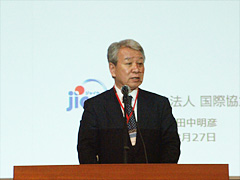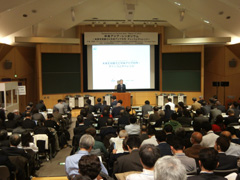On March 27, JICA President Akihiko Tanaka spoke at the symposium entitled “Central Asia plus Japan Symposium — Central Asia Now, Looking ahead to the Future: Opportunities and Challenges” (organized by the Ministry of Foreign Affairs; the Graduate Program on Human Security at the University of Tokyo, Graduate School of Arts and Sciences, College of Arts and Sciences; and The Japan Times), held at the University of Tokyo.
This symposium is part of “the Central Asia plus Japan” dialogue, a framework for discussion and cooperation with the countries of Central Asia, and it was held with objective of deepening understanding of and interest in Central Asia through debate on the geopolitical importance of Central Asia and the possibilities of cooperation between Japan and the region.

JICA President Akihiko Tanaka delivers the keynote address.
In addition to experts from the five countries of Central Asia (Kazakhstan, Kyrgyz, Tajikistan, Turkmenistan, and Uzbekistan), Dmitry Trenin, director of the Carnegie Moscow Center and Andrew Kuchins, director and senior fellow, CSIS (the Center for Strategic and International Studies) Russia and Eurasia Program and others participated, and more than 200 people were in the audience. After opening remarks by Kazuyuki Nakane, parliamentary vice-minister for foreign affairs and a greeting by Kenichi Ito, the Global Forum of Japan (GFJ), Tanaka delivered the keynote address.
During his remarks, Nakane referred to the Eurasian Diplomacy policy proposed by Prime Minister Ryutaro Hashimoto in the late 1990s and “the Central Asia plus Japan” dialogue that began in 2004, and he gave an introduction to the history of foreign relations between Japan and Central Asia. Also, he pointed out that Japan is second to the United States in terms of ODA contributions to Central Asia since 1992 and emphasized that Japan's ODA has played a large role in the development of the Central Asian region.
In the subsequent keynote address, Tanaka referred to the challenges and opportunities currently faced by Central Asia and detailed points for Central Asia to focus on in using these opportunities and taking on these challenges.
First he pointed out that the region, which seeks stable development, faces many challenges including the sanctions against Russia over the situation in Ukraine, incursions by the Islamic State of Iraq and the Levant (ISIL) and the withdrawal of the International Security Assistance Force from Afghanistan. In addition, regarding structural challenges the region has, he brought up the several important needs: employment opportunities, diversification of industry in non-resources areas, financial support and private sector investment, and improvement of deteriorated infrastructure. He also mentioned the situation of the region that cannot achieve some of the Millennium Development Goals.

The symposium
As for opportunities, he presented movement toward unleashing some of the region's potential powers while cooperating with nearby countries and regions. Specifically, there are some regional frameworks such as the Central Asia Regional Economic Cooperation (CAREC) (1), which advances cooperation in the energy and transport sectors, and the Shanghai Cooperation Organization (SCO) (2). Also, regarding recent new trends, he mentioned the inauguration of the Eurasian Economic Union (EEU) (3). Tanaka then explained that JICA has already realized concrete projects based on the discussions of “the Central Asia plus Japan dialogue”.
Finally, Tanaka pointed out the following three points to consider in using opportunities and taking on challenges: 1) to build and maintain intra-regional and extra-regional cooperative relationships as an open region, 2) to create strategies for increasing connectivity with neighboring countries and to take concrete actions, while developing domestic system such as administrative and judicial systems and business environment, 3) to create mechanisms for distributing the blessings of economic growth universally to the people by strengthening the capacity of the public sector.
In the panel discussion that followed, panelists had a lively discussion of the international environment surrounding Central Asia, regional issues related to transportation, logistics, water and energy, and cooperation from Japan, while touching on points Tanaka mentioned in his keynote address.
Based on the progress of the “Central Asia plus Japan dialogue”, JICA will endeavor to provide cooperation that connects the Central Asian Region with the outside world and realizes an open, strong Central Asian Region.
Notes:
- 1 . The Asian Development Bank launched CAREC in 1997 and became its secretariat. It is made up of 10 countries including the five countries of Central Asia plus Afghanistan, Azerbaijan, China, Mongolia and Pakistan, as well as six international organizations. It is a practical framework for cooperation that carries out specific development projects using donor funds in the priority sectors of energy and transportation.
- 2 . The Shanghai Cooperation Organization is a cooperative organization of the six countries of Russia, China, Kazakhstan, Kyrgyzstan, Tajikistan and Uzbekistan. It carries out wide-ranging cooperation in such areas as mutual confidence building among the member countries, politics, economics, counterterrorism, culture and education.
- 3 . The Eurasian Economic Union: Inaugurated in January 2015 by the four countries of Russia, Belarus, Kazakhstan and Armenia. Its purpose is to develop the free movement of capital, services and labor.




scroll